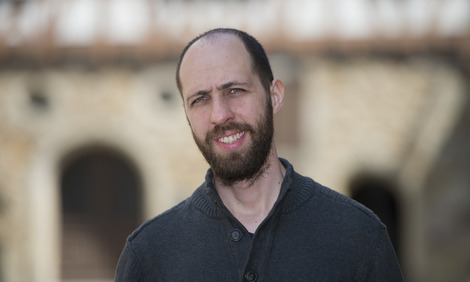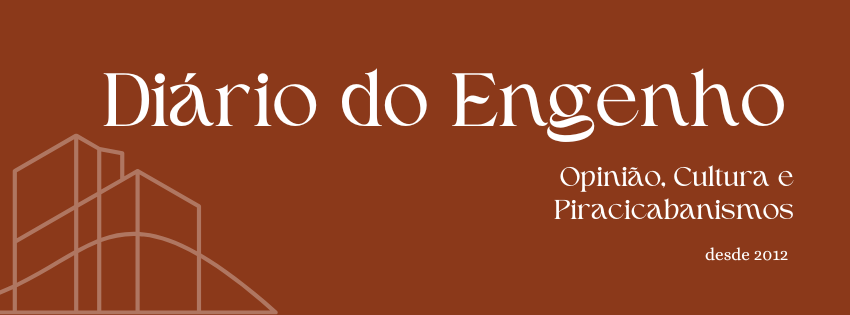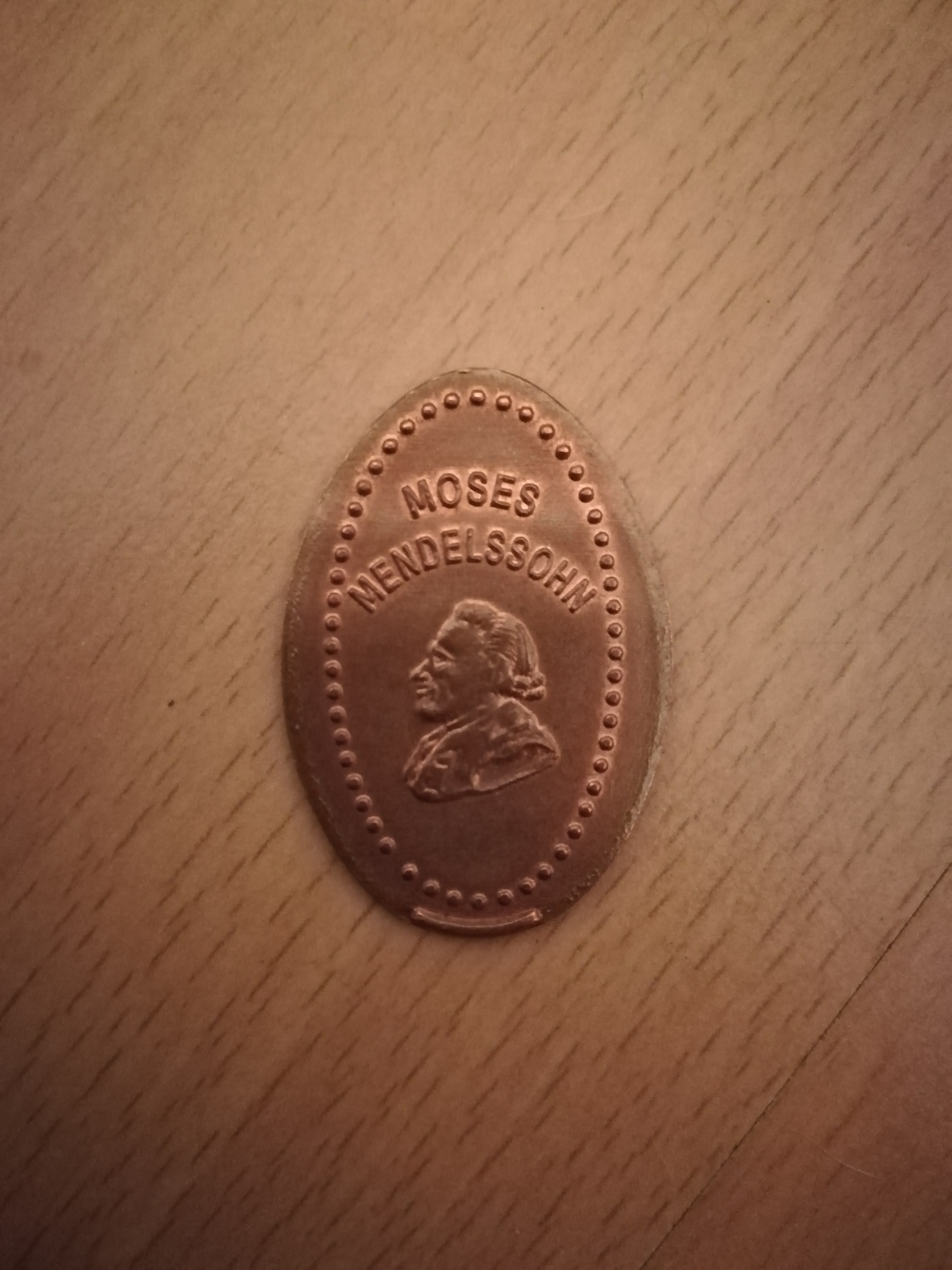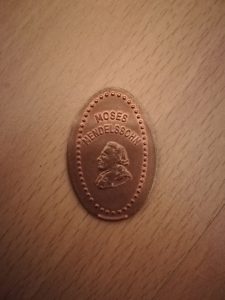Aos judeus: Contra o Brasil do Obscurantismo, uma Haskalah contemporânea
Reflexões sobre a missão dos judeus em um país que abraça a opressão e o retrocesso, e a necessidade de um novo Iluminismo
por Jean Goldenbaum
(*TEXT IN ENGLISH IS BELOW)
Há anos guardo em minha carteira um pequeno amuleto que comprei por exatos 5 centavos de Euro no Museu Judaico de Berlim. Este simples amuleto possui gravado em si o busto e o nome de um de meus heróis, o filósofo judeu alemão Moses Mendelssohn (1729-1786), um dos pais da Haskalah, movimento intelectual e filosófico nascido na segunda metade do século XVIII, que pode ser considerado como o ‘Iluminismo Judaico’.
Mendelssohn foi um dos importantes filósofos do Movimento Iluminista na Europa como um todo, tendo contribuido com as ideias a respeito da separação entre Religião e Estado e com toda uma revisão no que concerne a relação entre política e teologia. Representando a minoria judaica entre os intelectuais da época, teve também papel essencial no desenvolvimento da questão da tolerância religiosa. Seu livro Jerusalem, ou sobre o poder religioso e o Judaísmo, publicado em 1783 às vésperas da Revolução Francesa, é um marco na história da reflexão religiosa e filosófica judaica. Era amigo próximo de Gotthold Ephraim Lessing (1729-1781), outro dos principais nomes do Iluminismo, que publicou em 1779 sua obra prima Nathan, o Sábio, peça teatral que constitui até hoje um símbolo de apelo por um comportamento tolerante acerca das diferente fés. A propósito, o personagem central, Nathan – como analisam diversos estudadores da obra -, teria sido profundamente baseado no próprio Mendelssohn.
A Haskalah – termo hebraico que significa ‘sabedoria’, ‘conhecimento’, ‘inteligência’, ‘erudição’ – concretizou-se como um dos mais importantes marcos na história do Judaísmo. Baseando-se na ideia de que o homem deveria ser educado no uso da Razão, o movimento agiu como força transformadora dos parâmetros em que a sociedade judaica se encontrava. Nasciam visões progressistas sobre a religião e a cultura do povo, que deveriam efetivar a integração dos judeus ao Estado Moderno, mas sempre mantendo a identidade judaica. Ou seja: os judeus permaneceriam um grupo distinto e consciente de sua própria cultura, mas harmonizado à sociedade gentia.
Assim, os Maskilim (hebraico para ‘intelectuais’ ou ‘eruditos’, como eram chamados os líderes da Haskalah) traçaram diversas metas – revolucionárias para a época – a serem atingidas. Nas comunidades seria exercitada a liberdade de pensamento e de expressão. Costumes antigos e agora tidos como prejudiciais, como casamentos infantis (que ainda ocorriam, com crianças em idade de bar mitzvah) deveriam ser impedidos.
Principalmente na área da Educação a Haskalah foi decisiva. Um livro maravilhoso de 1792 de Naphtali Wessely (1725-1805) (discípulo de Mendelssohn) intitulado Palavras de Paz e Verdade (Divrei Shalom veEmet) encorajava o ensino do conhecimento secular juntamente com o religioso e celebrava o progressista ‘Édito de Tolerância’ recém-emitido pelo imperador da Áustria José II. Assim, implementou-se revolucionárias reformas nos programas de ensino, que passavam a contar não somente com o Hebraico em sua norma culta, mas também com o idioma do país em que os judeus viviam. Matemática e ciências passaram a ser estudadas ao lado do estudo da Torah, que deveria ser compreendida de forma literal e racional, sem interpretações alegóricas que poderiam ser moldadas conforme os interesses de cada pregador, buscando assim um convívio coerente entre as escrituras e o conhecimento secular da época. Em 1778 foi fundada por David Friedländer (1750-1834), pupilo de Mendelssohn, a ‘Jüdische Freyschule zu Berlin’ (Escola Livre Judaica de Berlim), onde pela primeira vez tanto matérias religiosas quanto seculares eram ensinadas. Esta escola existe até hoje (ainda que infelizmente sua base filosófica e ética tenha se perdido) e eu inclusive dei aulas de música nela por um semestre.
Embora nos séculos XVIII e XIX fossem admitidos nesta instituição somente rapazes, algo plenamente comum para a época, a Haskalah trouxe também uma revolução positiva para as mulheres não somente em termos de educação, mas também de colocação familiar e social. Enquanto antigamente nas comunidades religiosas o homem estudava (somente conteúdo religioso), a mulher acabava por assumir o papel de trazer dinheiro ao lar, ingressando no mundo comercial sem uma prévia instrução educacional. Embora possa parecer reacionário aos ouvidos de hoje, a proposta da Haskalah para as mulheres era altamente moderna na época: o homem deveria deixar o conforto do estudo em tempo integral e assumir a função provedora da casa (após estar apto a profissões de alto nível técnico ou intelectual), e a mulher administraria a casa e receberia educação religiosa e secular através de tutores e, futuramente, tutoras.
Assim, o movimento Haskalah, que se iniciara em Berlim, foi se estruturando e se expandiu a outras regiões habitadas por considerável número de judeus, como a Áustria, a Galícia e a Rússia. O pensamento progressista e racional passava a inundar o mundo judaico nas áreas da Educação, do Direito da Mulher, da Liberdade Pensamental e de Expressão, da Tolerância Religiosa, da compreensão de e comunicação com outras religiões, e por aí adiante. Este movimento foi a fundação para centenas de pensadores, filósofos e cientistas judeus que a partir do século XVIII contribuíram imensamente para a evolução das sociedades em todo o mundo.
E então chegamos aos dias de hoje, nos quais exatamente o oposto do pensamento Iluminista se instalou no Brasil. Sim, este é o Brasil do Obscurantismo. Este Brasil é a antítese de tudo o que os iluministas propunham:
-imposição de uma educação anti-libertadora (aos moldes de ditaduras e às avessas de Paulo Freire);
-relegação da mulher a ser inferior ao homem (não merece salário igual, “feminismo é doença”, “menina veste rosa”, mandar no próprio corpo se quiser abortar é coisa do diabo);
-intolerância religiosa, cultural e relativa a gênero (a bancada da Bíblia arquiteta sua inquisição; índio aceita perder sua terra ou leva bala; comunidade LGBT+ é tratada como “abominação” das piores);
-a ascensão de “formadores de opinião” completamente alucinados, que defendem a anti-ciência e o anti-humanismo;
-a desconstrução da verdade, da realidade e da História (“nazismo é de esquerda” e outros disparates);
-a máquina da censura se estrutura paulatinamente e já se mostra ora velada-, ora escancaradamente;
-e o culto à agressividade e à violência, é claro, não podia faltar na cartilha dos obscurantistas, que rapidamente trouxeram a liberação das armas.
A comunidade Judaica está dividida. Enquanto nos grandes escalões há judeus entre os maiores vilões deste opressor maquinário (de chefe de senado a juiz que descaradamente elimina investigações de corrupção de seus comparsas), há também uma maravilhosa parte da comunidade que atua a favor da luz.
Não me demorarei por um segundo sobre o porquê de parte dos judeus abraçarem o Obscurantismo e toda a opressão que este traz, afinal já o fiz de forma detalhada neste e neste artigo, dos quais recomendo a leitura. Não gastarei mais linhas com estes que não merecem nada além de combate. Endereço estas linhas aos companheiros judeus da Resistência, clamando que continuemos nossa linda luta diária, a qual resultará em uma Haskalah contemporânea, um novo iluminismo que o Brasil e o Judaísmo brasileiro necessitam mais do que nunca. É essencial que grupos intelectuais e de ação social e política se unam e se fortaleçam cada vez mais. Coletivos eficientes e bem estruturados já trabalham a todo vapor, como por exemplo: o ‘Observatório Judaico dos Direitos Humanos do Brasil’, o ‘Resistência Democrática Judaica’, o ‘Judeus pela Democracia’, o ‘Juprog – Judaísmo Progressista’, o ‘Judeus Unidos contra Bolsonaro’ e outros. Estaremos em manifestações, estaremos nos jornais, estaremos em Brasília, estaremos nas salas de aula. Afinal, nós judeus, como povo de caminhada milenar e tão árdua, não assistiremos passivos nem manietados à desconstrução da sociedade brasileira.
E para expandir: meu clamor não se limita somente ao Brasil! Sabemos que os mesmos judeus brasileiros que apoiam o opressor governo local também apoiam o opressor governo de Israel (muito infelizmente há pouco reeleito). E ambos os países estão tomando caminhos destrutivos e autodestrutivos. E somente uma nova Revolução da Razão, uma nova Era Iluminista realizada pelo povo pode reverter este cataclismo social e humano. E a Haskalah contemporânea há de começar no Brasil. Os judeus que refutam o Ódio farão sua parte, disto não tenho dúvidas, pois esta já começou a ser feita. As sementes estão sendo enviadas aos ventos e no momento certo começarão a brotar.
Concluo este artigo-apelo com as palavras que o próprio Moses Mendelssohn caracterizava como seu lema de vida, na esperança de que seu espírito esteja olhando por nós e seu legado mostre-se mais vivo do que nunca. “Buscar a Verdade, amar o Belo, querer o Bem, fazer o Melhor. Este é o propósito do homem.”
 Dr. Jean Goldenbaum é compositor e musicólogo, professor do Centro Europeu de Música Judaica da Universidade de Música, Teatro e Mídia de Hannover, Alemanha. Ativista social e político, faz parte do grupo ‘Resistência Democrática Judaica’ e é um dos membros fundadores do ‘Observatório Judaico de Direitos Humanos do Brasil’. www.jeangoldenbaum.com
Dr. Jean Goldenbaum é compositor e musicólogo, professor do Centro Europeu de Música Judaica da Universidade de Música, Teatro e Mídia de Hannover, Alemanha. Ativista social e político, faz parte do grupo ‘Resistência Democrática Judaica’ e é um dos membros fundadores do ‘Observatório Judaico de Direitos Humanos do Brasil’. www.jeangoldenbaum.com
***
To Jews: Against Brazil of Obscurantism, a contemporary Haskalah
Reflections on the mission of Jews in a country that embraces oppression and retrogression, and the need for a new Enlightenment
by Jean Goldenbaum
For years I have kept in my wallet a small amulet that I bought for an exact 5 Euro cents at the Jewish Museum in Berlin. This simple amulet has engraved in itself the bust and the name of one of my heroes, the German Jewish philosopher Moses Mendelssohn (1729-1786), one of Haskalah’s parents, an intellectual and philosophical movement born in the second half of the eighteenth century, which can be considered as the ‘Jewish Enlightenment’.
Mendelssohn was one of the important philosophers of the Enlightenment Movement in Europe as a whole, having contributed to the ideas about the separation of Religion and State and with a whole revision regarding the relation between politics and theology. Representing the Jewish minority among the intellectuals of the day, he also played a key role in developing the issue of religious tolerance. His book Jerusalem, or on religious power and Judaism, published in 1783 on the eve of the French Revolution, is a landmark in the history of Jewish religious and philosophical reflection. He was a close friend of Gotthold Ephraim Lessing (1729-1781), another of the leading names of the Enlightenment, who published in 1779 his masterpiece Nathan the Wise, a play that is still a symbol of the call for tolerant behavior about different faiths. By the way, the central character, Nathan – as analyzed by several scholars – would have been deeply based on Mendelssohn himself.
Haskalah – a Hebrew term meaning ‘wisdom’, ‘knowledge’, ‘intelligence’, ‘erudition’ – has become one of the most important milestones in the history of Judaism. Relying on the idea that man should be educated in the use of Reason, the movement acted as a transforming force of the parameters in which Jewish society found itself. Progressive visions were born about the religion and culture of the people, which should effect the integration of the Jews into the Modern State, but always maintaining the Jewish identity. That is: the Jews would remain a distinct and conscious group of their own culture, but harmonized to gentile society.
Thus, the Maskilim (Hebrew for ‘intellectuals’ or ‘scholars’, as the Haskalah leaders were called) drew various goals – revolutionary for the time – to be achieved. In the communities, freedom of thought and expression would be exercised. Old customs now regarded as harmful, such as child marriages (which still occurred with children of bar-mitzvah age) should be prevented.
Especially in the area of Education the Haskalah was decisive. A wonderful 1792 book by Naphtali Wessely (1725-1805) (disciple of Mendelssohn) entitled Words of Peace and Truth (Divrei Shalom veEmet) encouraged the teaching of secular knowledge together with the religious one and celebrated the progressive ‘Edict of Tolerance’ newly issued by the Emperor of Austria Joseph II. And so, revolutionary reforms were implemented in teaching programs, which not only included the learning of standardized Hebrew, but also the language of the country where the Jews lived. Mathematics and sciences began to be studied alongside the study of Torah, which should be understood in a literal and rational way, without allegorical interpretations that could be shaped according to the interests of each preacher, thus seeking a coherent relationship between the scriptures and secular knowledge of the time. In 1778 it was founded by David Friedländer (1750-1834), pupil of Mendelssohn, the ‘Jüdische Freyschule zu Berlin’ (Jewish Free School of Berlin), where for the first time both religious and secular subjects were taught. This school exists to this day (although unfortunately its philosophical and ethical base has been lost) and I even worked there as a music teacher for a semester.
Although in the eighteenth and nineteenth centuries only boys were admitted to this institution, something quite common at the time, the Haskalah also brought a positive revolution for women not only in terms of education, but also of family and social placement. While in ancient religious communities men studied (religious content only), women eventually assumed the role of bringing money home, entering the commercial world without a previous educational instruction. Although it may seem reactionary to today’s ears, Haskalah’s proposal for women was highly modern at the time: men should leave the comfort of full-time study and assume the role of provider (after being fit for intellectual or technical high-level professions), and the women would manage the house and receive religious and secular education through tutors and, in the future, also women tutors.
Thus, the Haskalah movement, which began in Berlin, was becoming structured and expanded to other regions inhabited by a considerable number of Jews, such as Austria, Galicia and Russia. Progressive and rational thought began to flood the Jewish world in the areas of Education, Women’s Rights, Freedom of Thought and Expression, Religious Tolerance, understanding and communication with other religions, and so on. This movement was the foundation for hundreds of Jewish thinkers, philosophers and scientists who from the eighteenth century contributed immensely to the evolution of societies around the world.
And then we come to the present day, in which exactly the opposite of the Enlightenment thought settled in Brazil. Yes, this is the Brazil of Obscurantism. This Brazil is the antithesis of all that the Enlightenment thinkers and doers proposed:
-imposition of an anti-liberating education (in the molds of dictatorships and against Paulo Freire (Brazilian educator and philosopher, one of the world’s leading advocate of critical pedagogy));
-relegation of women to be inferior to men (“does not deserve equal salary”, “feminism is illness”, “girls wear pink, boys wear blue”, and to decide about their own body about having an abortion is a “devil thing”);
-religious, cultural and gender-related intolerance (the “Bible politicians” design their neo-inquisition, Indians must choose between lose their land or be murdered, LGBT+ community is treated as the worst of “abominations”);
-the rise of utterly hallucinating “influencers” who advocate anti-science and anti-humanism;
-the deconstruction of truth, reality and history (“Nazism is left-wing” and other absurd claims);
-the censorship machine is gradually structured and shows itself already sometimes veiled, sometimes openly;
-and the cult of aggressiveness and violence, of course, could not be lacking in the obscurantist’s book, which quickly brought the liberation of guns to the society.
The Jewish community is divided. While in the great ranks there are Jews among the greatest villains of this oppressor machinery (from senate chief to judge who blatantly eliminates investigations of corruption from his cronies), there is also a wonderful part of the community that works for the light.
I will not linger for a second as to why the Jews embrace Obscurantism and all the oppression that it brings, after all I have already done so in detail in this and this article, of which I recommend reading. I will not spend more lines with these ones that deserve nothing but combat. I address these lines to the Jewish fellows of the Resistance, crying out that we continue our beautiful daily struggle, which will result in a contemporary Haskalah, a new Enlightenment that Brazil and Brazilian Judaism need more than ever. It is essential that intellectual movements and groups of social and political action unite and strengthen each other more and more. Efficient and well-structured collectives are already working at full speed, for example: the ‘Jewish Observatory of Human Rights of Brazil’, the ‘Jewish Democratic Resistance’, the ‘Jews for Democracy’, the ‘Juprog – Progressive Judaism’, the ‘Jews United against Bolsonaro’ and others. We will be in demonstrations, we will be in the newspapers, we will be in Brasilia (Brazil’s capital), we will be in the classrooms. After all, we Jews, as people of a millennial and so arduous path, will not watch passively or with bound hands to the deconstruction of Brazilian society.
And to expand: my cry is not confined to Brazil alone! We know that the same Brazilian Jews who support the oppressive local government also support the oppressive Israeli government (very sadly just re-elected). And both countries are taking destructive and self-destructive paths. And only a new Revolution of Reason, a new Enlightenment Era carried out by the people can reverse this social and human cataclysm. And the contemporary Haskalah is to begin in Brazil. The Jews who refute the Hatred will play their part, of this I have no doubt, for this has already begun to be done. The seeds are being sent to the winds and at the right moment they will begin to sprout.
I conclude this article-appeal with the words that Moses Mendelssohn himself characterized as his motto of life, in the hope that his spirit will be looking after us and his legacy will be more alive than ever. “To seek the Truth, to love the Beauty, to want the Good, to do the Best. This is the purpose of man.”
 Dr. Jean Goldenbaum is a composer and musicologist, professor at the European Center for Jewish Music at the University of Music, Theater and Media in Hannover, Germany. Social and political activist, he is a member of the ‘Jewish Democratic Resistance’ group and is one of the founding members of the ‘Jewish Observatory of Human Rights of Brazil’. www.jeangoldenbaum.com
Dr. Jean Goldenbaum is a composer and musicologist, professor at the European Center for Jewish Music at the University of Music, Theater and Media in Hannover, Germany. Social and political activist, he is a member of the ‘Jewish Democratic Resistance’ group and is one of the founding members of the ‘Jewish Observatory of Human Rights of Brazil’. www.jeangoldenbaum.com


